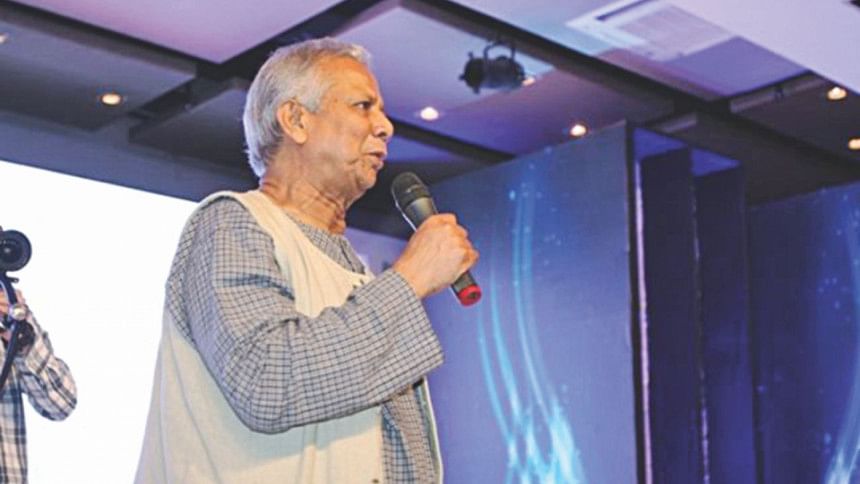A human way to do business

I believe the division between social and conventional business is artificial and antiquated. All businesses are done by people and for people. All businesses are, therefore, social.
Not quite. They should be.
Nobel laureate Dr. Muhammad Yunus has proved that social business is not only sustainable but also replicable. Healthcare, education and training, financial services, information technology, infrastructure development, renewable energy—in all these areas social business has the potential to bring real change benefiting the bottom 60 percent of world population and help them get out of poverty.
Many young people around the globe today do not see a way out of poverty within the frame of the current capitalist order where the top half population owns 99 percent of the wealth, leaving only 1 percent for the bottom half. I don't think this is how Adam Smith envisioned capitalism—we just redefined it to suit our purpose. Social business represents a departure from that world in which, tiny minorities of elites have been deciding the future of rest.
The main purpose of social business is to build in sustainability into development activities. The investor solves a problem by creating a business. Investors do not take any profit from their investment, except for getting their investment money back.
One of the major initiatives of Grameen Family is undertaking Nobin Udyokta (NU), or "New Entrepreneurs" programme. The Nobin Udyokta (New Entrepreneur) Programme is a new dimension in the development of Social Business in Bangladesh. They are the children of Grameen Bank borrowers. Grameen created a Social Business Fund to invest into the businesses of the children of Grameen Families. The programme encourages young individuals of the community to create employment for themselves as well as others by using their creative, innovative and entrepreneurial skills. In the NU case the investor solves the problem of youth unemployment. The New Entrepreneur is responsible for paying back whatever money he or she received as equity within an agreed period. As the business makes profit, the investor receives his/her dividend. So from the investors' point of view this is social business but new entrepreneurs do profit driven business. Even profit-driven businesses can be designed as social businesses by giving full or majority ownership to the poor. This constitutes a second type of social business. Grameen Bank has done exactly that.
A great challenge for social business is to sell products or services at affordable prices to customers—often the poorest of the poor—while generating enough revenue to be financially viable. To overcome this hurdle, it must achieve an affordable price point, while demonstrating the value of its product or service. In addition, it must know how to physically reach its target customers through the right distribution channel. For example, Grameen Danone had to invent a totally new marketing system to keep the market fragmented so that the low-cost "Shokti Doi" is reserved only for the poor children and does not appear in the urban market for the well-to-do. Today Grameen Distribution employs roughly 9,000 women, men and young people to sell products in Bangladeshi villages, reaching nine million of the remotest households of the country.
People are still learning what it means to be a social business. Some people confuse CSR activity with social business. Rather than giving out charity, CSR funds can be used to promote social business. If a charity can be converted into a social business it becomes a powerful undertaking because now the money invested is recycled endlessly.
Professor Yunus is taking social business to the root level by creating Social Business Villages (SBV). To make it an autonomous and economically viable entity, they take a Union, the lowest local government unit in Bangladesh, covering a cluster of about 20 villages, as the "greater village".
Since late 2011, this new model of business has come a long way with Yunus Social Business (YSB) financing 20 social businesses and expanding into eight countries: Albania, Brazil, Colombia, Haiti, India, Kosovo, Tunisia, and Uganda. And here at home, 1,039 social business projects have been approved for investment by programmes initiated by Professor Yunus.
A business that makes nothing but money is a bad business. The food we eat is contaminated with toxic chemicals. We cannot trust our hospitals and other service providers. Everything that is decent in the human spirit seems to be in decline. Social business can give us a way out—if we want it. Social business leverages on business competencies such as quality management, employee motivation and improved organisational culture. Social entrepreneurs excel at togetherness. They are role models to others.
Grameen has set some good examples of that. Grameen Danone Foods Ltd produces yogurt containing 12 nutrients missing from malnourished children's diet. Grameen Veolia Water sells safe drinking water at affordable prices, Grameen Intel creates software applications that address specific social problems; BASF Grameen produces impregnated mosquito nets that are long lasting and safe for use by families to combat insect-borne diseases. Grameen Caledonian College of Nursing provides world class training facilities for a career in nursing. Grameen GC Eye Care Hospital, founded in 2007 offers low-cost eye care.
A human being is not just a money making machine. Economics alone cannot define him. By engaging in social business it is possible to change the character of capitalism to the benefit of the many and not a few, and solve many of the world's social and economic problems within the scope of the free market.
There is ample evidence that people are moving from wanting to just own and earn things to wanting to feel and belong to something bigger than themselves. Social business offers the world that opportunity.
The writer is an engineer-turned-journalist.

 For all latest news, follow The Daily Star's Google News channel.
For all latest news, follow The Daily Star's Google News channel. 



Comments